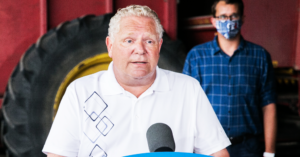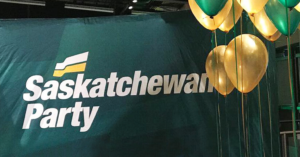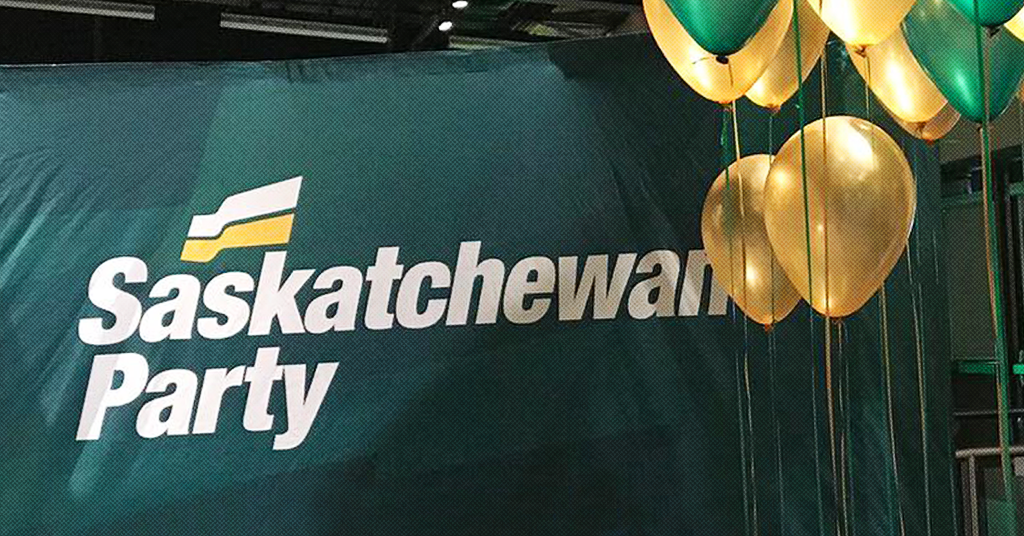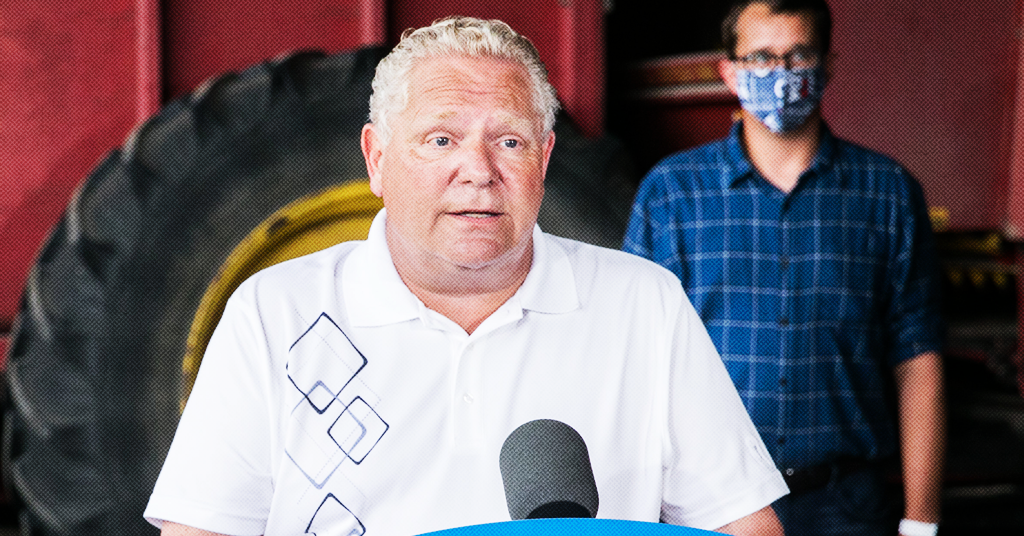
Doug Ford’s Ministry Of Labour is Giving Migrant Worker Employers Advance Notice of COVID-19 Inspections
Giving employers a heads up before an inspector shows up could defeat the purpose of an inspection, experts say
During a webinar this spring, a representative of Ontario’s Ministry of Labour assured some of the province’s big agricultural employers that they may get a call telling them an inspector is on their way before workplace inspections during the COVID-19 pandemic.
Experts say that may undermine the purpose of having proactive inspections.
The assurances came during anApril 21 webinar hosted by the Ministry of Labour briefing employers on its Temporary Foreign Agricultural Workers Initiative and the Ministry’s response to COVID-19, in the farming and agricultural sector.
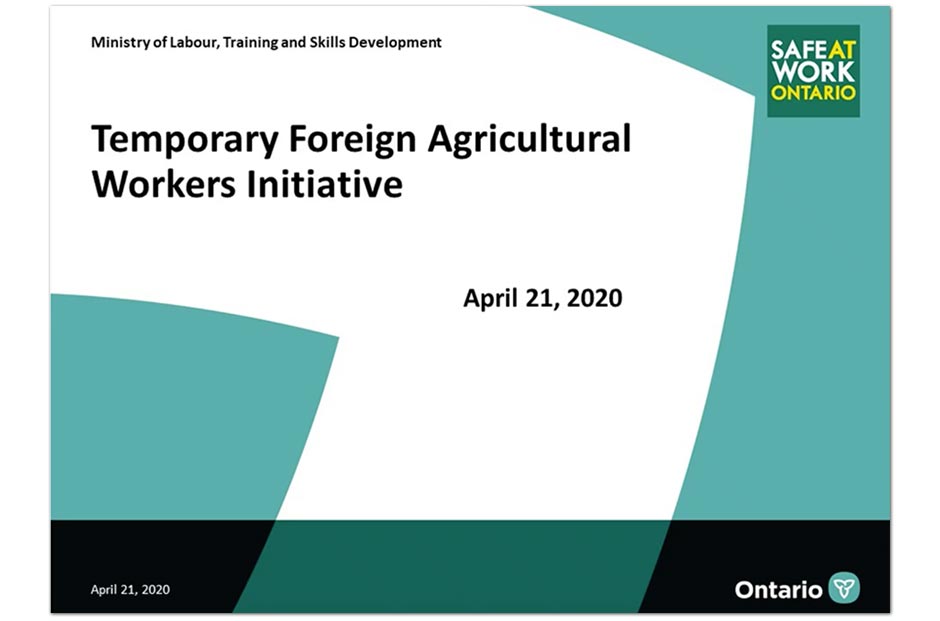
Temporary Foreign Agricultural Workers Initiative webinar (Ontario Ministry of Labour)
The ministry representatives said the webinar intends to “provide education, support and client assistance” as the Ministry began to “conduct proactive workplace inspections focusing on workplaces that employ temporary foreign agricultural workers across the province.”
One specific objective of the webinar was “outlining what to expect during an inspection for this initiative.”
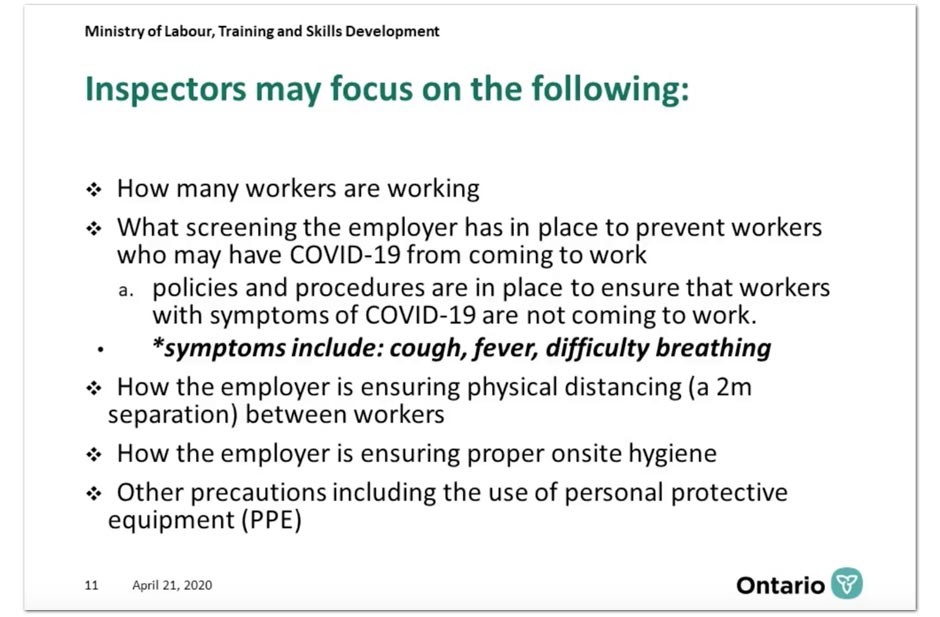
Temporary Foreign Agricultural Workers Initiative webinar (Ontario Ministry of Labour)
During the webinar’s question and answer segment, one employer asked Ministry representatives: “Will I be notified of an inspection” and “what will they be looking for?”
Ron Landry, an occupational health and safety specialist with the Ministry of Labour, responded:
“They are proactive inspections and typically (with) proactive inspections, there is no prior notification they just show up at the worksite. That said, given that it is a pandemic, the inspector may call in advance to let the workplace know that they’re coming and to check on any situations as far as outbreaks are concerned.”
Landry confirmed that inspectors could, in some cases, give employers advance notice of a proactive inspection.
“During a pandemic, yes there could be an opportunity where the inspector can call ahead to be sure any special precautions are in place for an outbreak in process,” Landry told PressProgress.
Asked how much notice an employer would typically receive, ahead of a proactive inspection, Landry said: “That’s up to the inspector. In any case, it’s not like they’re gonna tell them you know ‘I’m gonna be there in a month.’ In my experience, as an inspector, it would be same-day notice.”
Despite initially indicating they would provide a statement, Ontario’s Ministry of Labour did not respond to multiple requests for comment from PressProgress.
A number of experts said the Ministry of Labour’s practice of giving employers advance notice of an inspection is problematic.
“Providing advance notice of proactive inspections is a problem,” York University political science professor Leah Vosko told PressProgress.
Vosko said that while prior notice of inspections is allowed, it may hamper the protection of vulnerable workers “particularly in the context of a pandemic where different types of workplace risks and problems may come together,” including “health and safety” and “minimum employment standards.”
Osgoode Hall law professor Eric Tucker likewise told PressProgress “The problem with proactive inspections with advance notice is that it may result in employers taking measures to change the ‘normal’ condition of the workplace.”
“As a result, the inspector may inspect an ‘artificial’ workplace which has been temporarily remediated, but is unlikely to remain in that condition after the inspection is completed,” Tucker explained.
“The benefit of an unannounced inspection is that the inspector sees the workplace in the condition it is usually kept. If there are violations, the inspector will issue orders or possibly issue tickets or recommend a prosecution. If only orders are issued, not only will there be record of the violation, but there will be follow up to insure there has been compliance.”
Earlier this month, the Globe and Mail reported a rise in COVID-19 cases among Ontario’s migrant agricultural workers — accounting for up to 800 confirmed cases.
University of Windsor law professor Vasanthi Venkatesh said there appear to be signs employers are using the advance notice to make sure everything appears to be in order when the inspector arrives.
“From what workers have told us, the employers are well aware of when the inspections happen and are prepared,” Venkatesh told PressProgress. “Changes are made for the purpose of inspections to make it appear as if the workplace complies with the regulations.”
Venkatesh said the precariousness of many agricultural workers further keeps them from speaking out about infractions.
“Workers are still tied to that specific employer because of their work permit except, in rare cases, when they can prove egregious abuse.”

